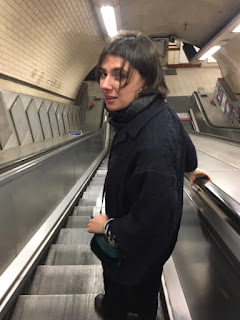Oxford Brookes PoetryFilm Competition 2019
2019 is the first year that we have run a poetryfilm competition - and we've been delighted with the entries! Very many thanks to everyone who entered and responded so beautifully and powerfully to poems by our ignitionpress poets.
We will be sharing the winning poetryfilms on our website soon and will be holding a screening in Oxford during October of all the films that were entered. Watch this space for more details. We will also be sharing the films with our poets who, we are sure, will be excited and overwhelmed! You can find out more about ignitionpress and the poets’ work on our website.
The competition was conceived and organized by Theodora Vida, one of our Poetry Centre Interns for this year, and judged by our team of Interns and the Director of the Poetry Centre, Dr Niall Munro.
Because of the excellent standard and fascinating engagement with the poems, we sometimes found it difficult to choose between films; we were so impressed with the sympathy that filmmakers showed towards the subject matter of the poems and the deft and sensitive way in which they interpreted the words on the page. Thank you again for sending us such terrific work.
The results are:
FIRST PRIZE:
Gabrielle Turner for her interpretation of Patrick James Errington’s poem ‘Half Measures’
SECOND PRIZE:
Marie Craven for her poetryfilm about Patrick James Errington’s poem ‘Half Measures’
THIRD PRIZE:
Jane Glennie for her poetryfilm of Natalie Whittaker’s poem ‘Moss’
COMMENTS FROM THE JUDGES:
There were a number of films entered about Natalie’s poem ‘Moss’, but we felt that Jane Glennie’s interpretation really caught the elemental, vivid and unsettling nature of the poem. Brilliantly edited in a way that captured the organic growth of the images in the piece and with a truly evocative soundscape, Jane’s poetryfilm expressed so much in such a relatively short film - rather like the poem itself!
Marie Craven’s poetryfilm of Patrick’s poem ‘Half-Measures’ has the feeling of an epic condensed into just four minutes! This is a beautifully shot and edited film which subtly treats a poem about loss and reflection with some magically matched images: a figure is indistinctly framed as the voiceover describes their contemplation of pictures by the Dutch masters; images of halfness occur again and again - the slicing of half a loaf of bread, half a man’s face is illuminated in the sunshine; and a small child movingly hugs her toy bear as if to represent an attempt at comfort despite almost indescribable loss. This is a superbly realised piece that serves the poem wonderfully well whilst being its own form of art.
Everything about Gabrielle Turner’s poetryfilm of ‘Half Measures’ indicates it has been intricately conceived and planned. The concept of dividing the screen in half was a great innovation that not only suggests the speaker’s life before and after ‘she’ left, but also allows us to feel the poignancy of that loss by seeing past and present together at once. At times, this technique also throws up some remarkable parallels - on one side of the screen we see the protagonist making his bed, alone, whilst on the other we see a glimpse of the loving life that is now absent. Later in the film we see a calendar on one side full, we assume, with social occasions, whilst on the other side the calendar is completely blank. And later still, when the speaker thinks about the half measure in relation to ‘a child’s hands, still/sticky with the juice from a poorly-divvied fruit’, we see the child eating the fruit and gesturing towards the camera - an image that seems to taunt the speaker with what might have been. This is a poetryfilm that combines sound, word and image to not only tease out many of the key ideas in the poem but also to act as a powerful meditation on longing and loss.
Many congratulations to all three winners, and thank you again so much to everyone who entered! We hope to run the competition again in 2020, so please stay connected with us by signing up to our Weekly Poem e-mail (also our newsletter) or on Facebook, Twitter, and Instagram (@brookespoetry).












